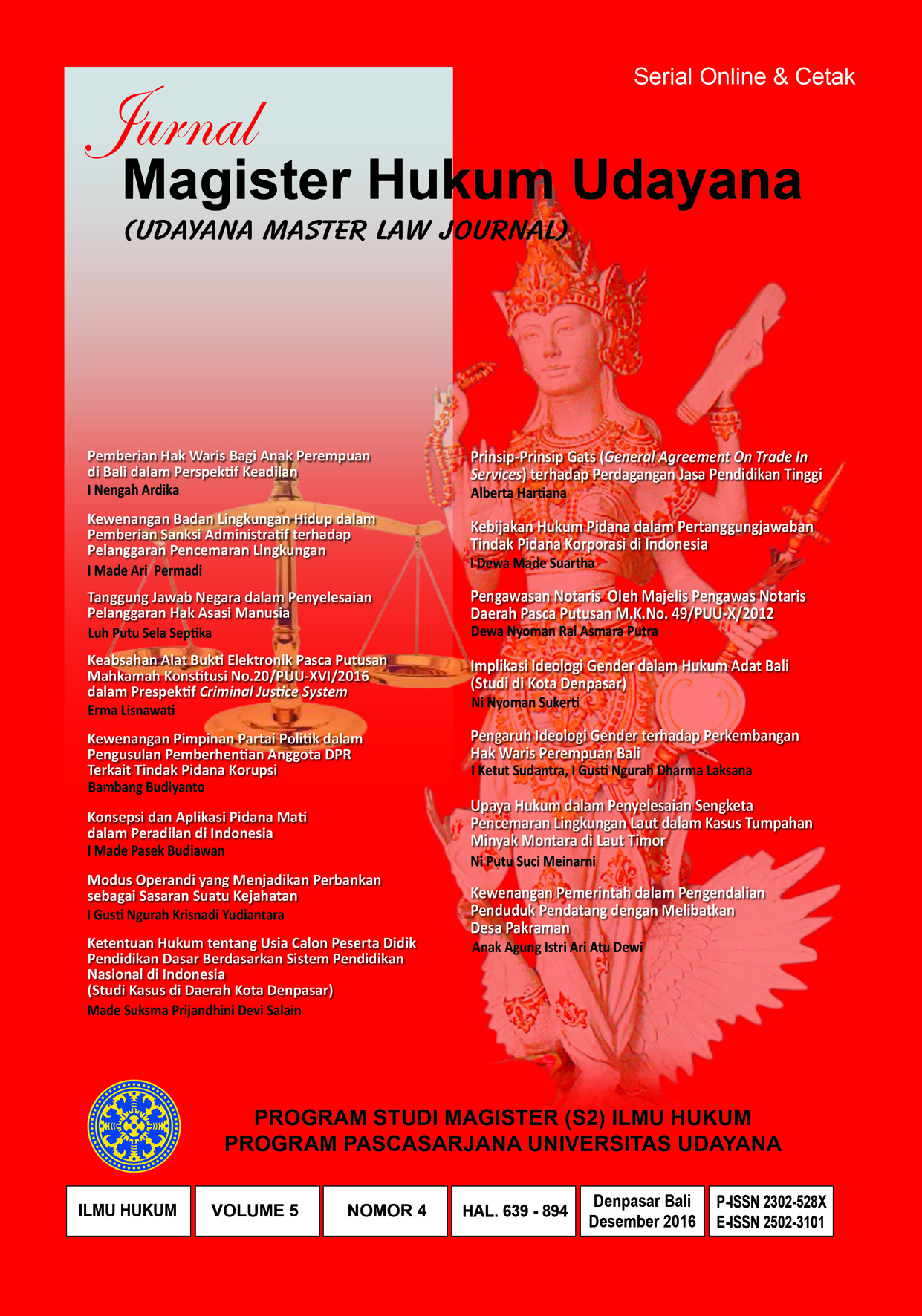IMPLIKASI IDEOLOGI GENDER DALAM HUKUM ADAT BALI (STUDI DI KOTA DENPASAR)
Abstract
Customary law is the law of life and as a guideline to behave in social life. While the government through Presidential Decree No. 9 of 2000 on Gender Pengharusutaan in National Development. In connection with these two problem are; 1). What is the meaning of the gender ideology? and 2). How the ideological implications of the customary law of Bali? This study is a socio-legal, where field data as primary data. The results of the study addressed that there are two groups; The first group's view justify Balinese customary law is sound and reflects the uniqueness of Balinese society, women are not involved in decision-making in the family, a decision was taken on the deal man. In the field of inheritance girls are not taken into account. So the first group did not reflect the views of gender ideology, while the second group's view, gave the reason that customary law is difficult to change, to change requires public awareness, awig-awig has not set things up in accordance with the development of society and legislation can be made perarem. Most respondents have not gender responsive and only a small portion gender responsive and progressive-minded. Thus gender ideology customary law is not implicated in Bali. Factors that become barriers that the legal culture of the Balinese people, the patriarchal customary law is still strong binding Balinese life. The conclusion that the meaning of gender ideology implies equality of men and women and it is not affected by the customary law of Bali, because of the legal culture of society and customary law still strong binding.
Hukum adat adalah hukum kehidupan dan sebagai pedoman untuk berperilaku dalam kehidupan sosial. Sedangkan pemerintah melalui Keputusan Presiden Nomor 9 Tahun 2000 tentang Kesehatan Jender dalam Pembangunan Nasional. Sehubungan dengan kedua masalah tersebut adalah; 1). Apa arti ideologi gender? Dan 2). Apa implikasi ideologis hukum adat Bali? Penelitian ini bersifat sosio-legal, dimana data lapangan sebagai data primer. Hasil penelitian menyebutkan bahwa ada dua kelompok; Pandangan kelompok pertama tentang membenarkan hukum adat Bali adalah suara dan mencerminkan keunikan Bali, wanita tidak terlibat dalam pengambilan keputusan di dalam keluarga, sebuah keputusan dibuat berdasarkan kesepakatan manusia. Di bidang warisan anak perempuan tidak diperhitungkan. Jadi kelompok pertama tidak mencerminkan pandangan ideologi gender, sedangkan pandangan kelompok kedua, dengan alasan bahwa hukum adat sulit untuk berubah, untuk berubah membutuhkan kesadaran masyarakat, awig awig tidak mengatur segala sesuatu sesuai dengan perkembangan masyarakat. Dan perundang-undangan bisa dibuat perarem. Sebagian besar responden belum responsif terhadap gender dan hanya sedikit yang responsif terhadap gender dan progresif. Dengan demikian ideologi gender hukum adat tidak dilibatkan di Bali. Faktor-faktor yang menghambat budaya hukum masyarakat Bali, hukum adat patriarkhi masih mengikat kehidupan masyarakat Bali yang kuat. Kesimpulan bahwa makna ideologi gender menyiratkan kesetaraan laki-laki dan perempuan dan tidak terpengaruh oleh hukum adat Bali, karena budaya hukum masyarakat dan hukum adat yang mengikat.
Downloads
Jurnal Magister Hukum Udayana (Udayana Master Law of Journal) by Faculty of Law Udayana University is licensed under a Creative Commons Attribution-NonCommercial 4.0 International License.



















